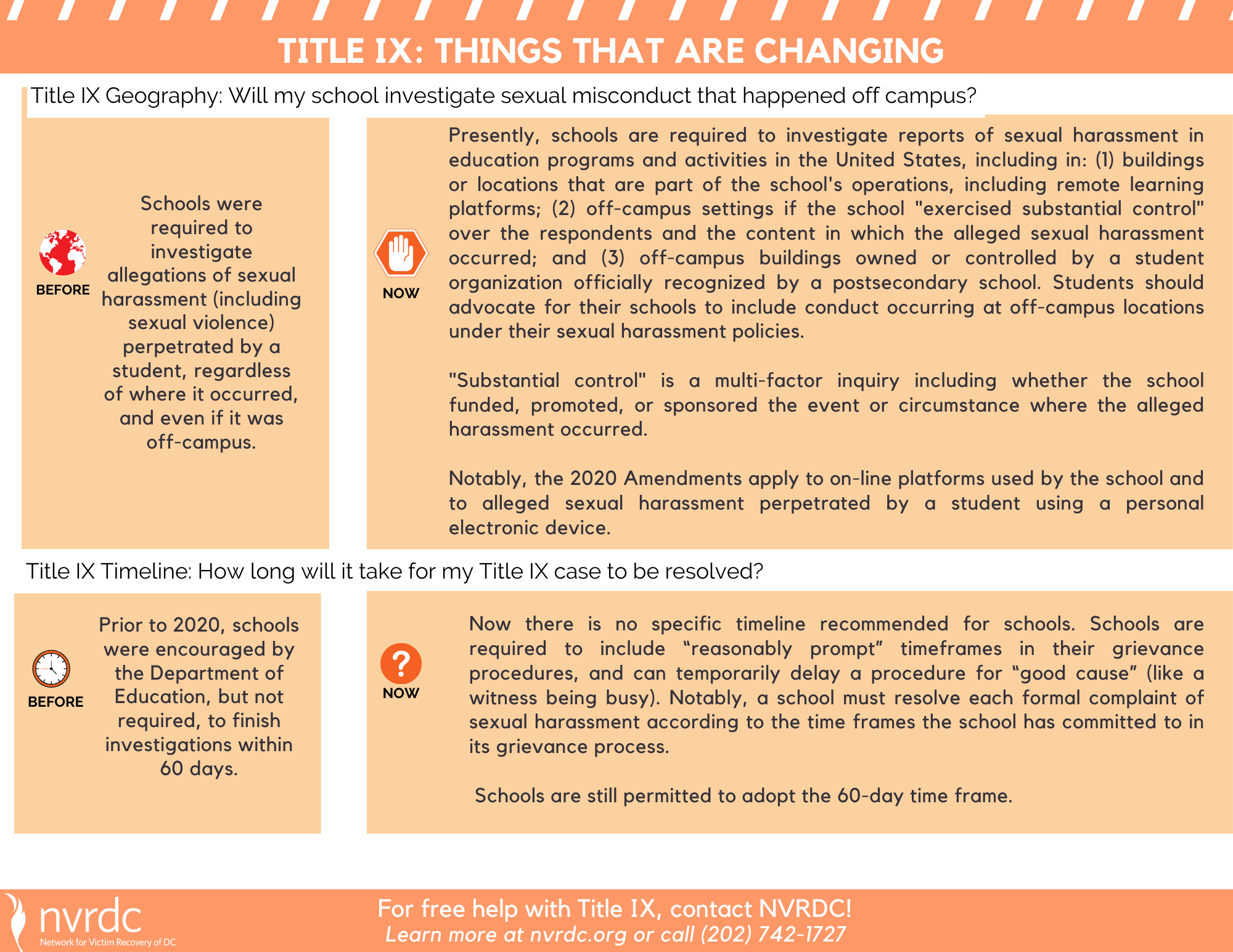Title IX Resources
If you’re a student-survivor at a DC college or university and want to discuss your questions with an NVRDC advocate or lawyer, call us or use our Get Help form! To learn more about our Title IX services, visit our Title IX page.
Title IX and the Clery Act for Higher Education Students: Know Your Rights!
Do you know what Title IX is? How about the Clery Act? Do you know how these federal laws affect your rights as a student survivor? Read our handout to learn more!
What will Cross-Examination look like in Title IX hearings?
Do you know the new Title IX changes require live hearings with a Cross Examination? Learn more about what this will look like, if witnesses are required to testify, the types of questions that will be asked and more.
Need help understanding what is changing and what is staying the same under the new Title IX Rule?
It’s hard to keep track of all the 2020 Title IX changes that are coming and what they will mean for students. NVRDC created this handout to breakdown that information and explain how Title IX proceedings may change after the August 14th implementation date.
This handout is intended for student-survivors, but can also address questions the public may have about the rule changes.
PDF version of NVRDC’s #IXThingstoKnow Handout
Formal Complaints Under Title IX: Q&A
This Question and Answer handout focuses on formal complaints in Title IX cases. If you’re having trouble understanding what a complaint is, what its role is within the Title IX context, how you can access one, and what the impact is, this is the handout will help!
PDF version of Formal Complaints Under Title IX: Q&A
Your Rights Under the Clery Act: Q&A
You’ve heard of Title IX but did you know the Clery Act also provides important rights and protections for student-survivors? Learn more from our handout!
PDF Version of Your Rights Under the Clery Act: Q&A
Title IX Supportive Measures: Q&A
Supportive measures, accommodations…have you heard of these Title IX & Clery terms? Do you know what they mean? Do you know how they can help make you feel safer? Learn more from our handout!
PDF version of Title IX Supportive Measures: Q&A
Title IX & Non-Students: Q&A
Title IX cases that involve a non-student can get confusing. We’re hoping our handout can help clarify what happens if the parties attend different schools, if one party graduates before the other, or if only one party is a student.
PDF version of Title IX & Non-Students Q&A
Title IX and COVID-19: Q&A
How will COVID-19 impact Title IX cases this school year? Learn more in our handout about what student-survivors may expect in their Title IX cases.
PDF version of Title IX and COVID-19: Q&A
Title IX Informal Resolutions: Q&A
Informal resolution is one of the most debated parts of the new Title IX regulations. Do you know what it is? How do you know if it's right for you? What are the rules? Check out NVRDC's handout to learn more!
PDF Version of Title IX Informal Resolutions: Q&A
Title IX Toolkit for Advocates: Q&A
The new Title IX regulations go into effect on August 14th, 2020 but that doesn’t mean that all hope is lost! Survivors and their allies can still advocate for change on their campus! The new regulations establish the minimum requirements, but schools can CHOOSE to go beyond the basics and protect student-survivors. Learn more in our handout!
PDF version of Title IX Toolkit for Advocates: Q&A
Title IX, Defamation and Social Media: Q&A
Many survivors have questions about sharing their story publicly, either through social media or other means. This Q&A explores the considerations survivors should weigh before choosing how to share their story
PDF version of Title IX, Defamation and Social Media: Q&A
The Red Zone: Sexual Violence Resources & Information for DC College Students
The beginning of the school year is an exciting time for college students, but it also marks the start of the something known as the “red zone.” One in 5 women and one in 16 men are sexually assaulted while in college, more than 50% of those sexual assaults occur during the “red zone,” which takes place throughout August, September, October, and November.
As DC college and university students head back to school for a new year, we want to empower them with knowledge, information, and resources about sexual assault.













